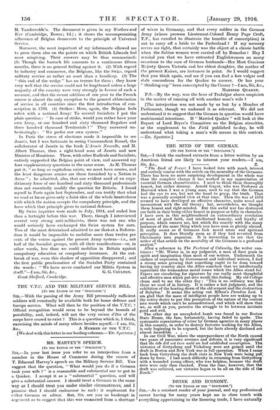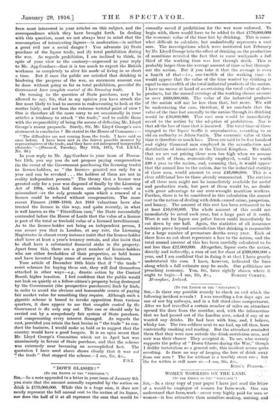DRINK AND ECONOMY.
[To THE EDITOR OF TUB " SPECTATOR."] Sm,—As a constant reader of your journal, and my professional career having for many years kept me in close touch with everything appertaining to the licensing trade; I have naturally
been most interested in your articles on this subject, and the correspondence which they have brought forth. In dealing with this question, must we not always bear in mind that the consumption of intoxicating liquors—in moderation—is neither
a great evil nor a social danger ? You advocate (a) State purchase of the liquor trade, and (b) total prohibition during the war. As regards prohibition, I am inclined to think, in spite of your view to the contrary—expressed in your reply to Mr. Agg-Gardner—that it is too much to expect the British workman so completely to alter his mode of living in so short a time. But if once the public are satisfied that drinking is hindering the progress of the war, an enormous amount can be done without going so far as total prohibition, provided the
Government have complete control of the licensing trade.
On turning to the question of State purchase, may I be allowed to say, Sir, that in my opinion you have struck the line most likely to lead to success in endeavouring to look at the matter fairly, and not from the extreme teetotal point of view ? One is therefore all the more sorry to see occasionally in your articles a tendency to attack " the trade," and to saddle them with the responsibility of being the means of defeating Mr. Lloyd George's recent proposals. Surely, Sir, Mr. Lloyd George's own statement is conclusive ? He stated in the House of Commons :-
" The difficulties are not coming from the trade. I have said so once before. I have been met in the fairest possible manner by representatives of the trade, and they have not interposed insuperable obstacles."—(Hansard, Tuesday, May 11th, 1915, Vol. LXXI., No. 50.) In your reply to Mr. Agg.Gardner in your issue of Decem- ber 11th, you say you do not propose paying compensation (in the event of the Government purchasing the licensing trade) to licence-holders, as " the licences granted are only for a
year and can be revoked . . . the holders of them are not in reality independent persons." The theory that a licence was granted only for a year was disposed of finally by the Licensing Act of 1904, which laid down certain grounds—such as misconduct—as the only grounds upon which a renewal of a licence could be refused without compensation. The more recent Finance (1909-1910) Act 1910 valuations have also treated the licence in this way, and quite recently, in what is well known as the " Fitzwilliam case," the State successfully contended before the House of Lords that the value of a licence is part of the total or freehold value of a licensed hereditament. As to the licence-holder not being an independent person, I can assure you that in London, at any rate, the Licensing Magistrates in almost every instance insist that the licence-holder shall have at least a year's tenancy certain, and also insist that he shall have a substantial financial stake in the property.
Apart from this, there are a great number of licence-holders who are either freeholders of their properties, or hold leases and have invested large sums of money in their business.
Your article of December 18th hints that if " the trade " resist schemes for buying them out, they will find themselves attacked in other ways—e.g., drastic action by the Control Board, higher taxation. I feel confident that the public would not look on quietly at a fellow-citizen's property being destroyed by the Government (the prospective purchasers) limb by limb, in order to avoid the obvious and honourable course of paying fair market value for something they require. Although such a gigantic scheme is bound to invoke opposition from various quarters, it does appear to me that complete control by the Government is the only way out. This can or should only be carried out by a scrupulously fair system of State purchase, and compensating every interest damaged. As regards the cost, provided you retain the best brains in " the trade " to con- duct the business, I would make so bold as to suggest that the country would have a good bargain. It is an open secret that Mr. Lloyd George's Committee which sat in April last was Unanimously in favour of State purchase, and that the scheme was extremely near becoming an accomplished fact. The quotation I have used above shows clearly that it was not the trade " that stopped the scheme.—I am, Sir, &c., F.S.I.



















































 Previous page
Previous page